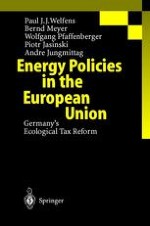2001 | OriginalPaper | Buchkapitel
Conclusions
verfasst von : Prof. Dr. Paul J. J. Welfens, Prof. Dr. Bernd Meyer, Prof. Dr. Wolfgang Pfaffenberger, Piotr Jasinski, Dr. Andre Jungmittag
Erschienen in: Energy Policies in the European Union
Verlag: Springer Berlin Heidelberg
Enthalten in: Professional Book Archive
Aktivieren Sie unsere intelligente Suche, um passende Fachinhalte oder Patente zu finden.
Wählen Sie Textabschnitte aus um mit Künstlicher Intelligenz passenden Patente zu finden. powered by
Markieren Sie Textabschnitte, um KI-gestützt weitere passende Inhalte zu finden. powered by
Germany’s energy policy has introduced new elements in the form of phasing-out nuclear energy and of introducing an ecological tax reform. At the core of energy policies in the 1990s is the electricity and gas market. With the share of nuclear energy declining in the long run the import of gas and gas-fired power plants are likely to become more important — creating new opportunities for importing gas from Russia which, however, represents some supply risk due to political uncertainties and economic instabilities (WELFENS, 1999c). Gas imports and electricity imports, respectively, will increase in the long run. There are also prospects for rising German/EU electricity imports from transforming economies in eastern Europe where governments increasingly are aware of the need to combine modernization of the energy sector with requirements of environmental protection; but with respect to individual countries of the Visegrad group there are considerable differences (WELFENS/ YARROW, 1997; JASINSKI/ SKOCZNY, 1996a and 1996b; JASINSKI/ PFAFFENBERGER, 1999; WELFENS/ GRAACK/ GRINBERG/ YARROW, 1999).
